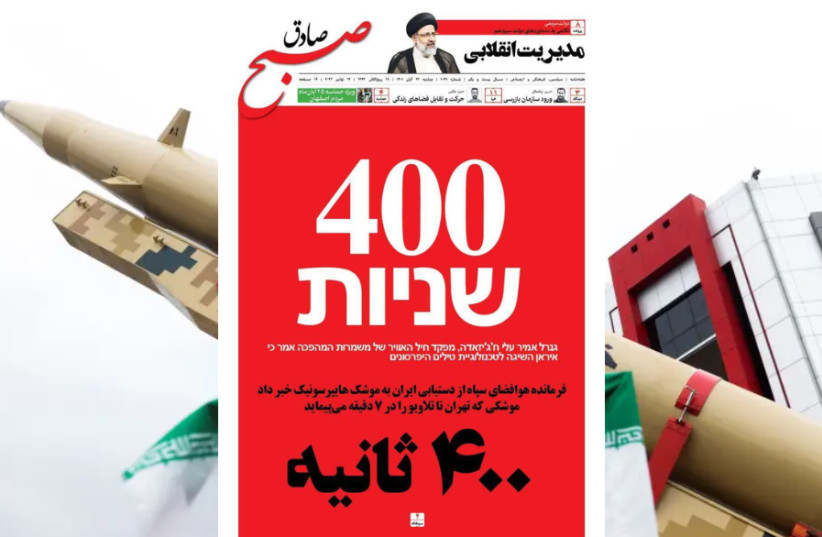Iranian media with alleged links to Islamic Revolution Guards Corps (IRGC) is threatening a hypersonic strike on Israel when tensions have already been rising between the two rival nations.
Last week, the Commander of Iran’s Islamic Revolution Guards Corps Aerospace Force, Amir Ali Hajizadeh, announced that Iran had developed its first national hypersonic ballistic missile.
While breaking the news of a brand-new indigenously developed hypersonic missile, the Commander said, “This new missile will pass all missile defense verification systems, and I don’t think there will be technologies capable of resisting it for decades,” reported Tasnim News Agency.
Not dissuaded by the criticism from its regional rivals like Israel and International Institutions influenced by the United States, Iran’s media has gone on a rhetorical rampage.
Iran’s popular publication Sobh-e-Sadegh, which allegedly has links with the Revolutionary Guard, published a covert threat to Israel, implying that the new Iranian hypersonic missile could reach Israel in just 400 seconds.

While the content of the article written by an Iranian defense expert was itself not a direct threat, it was published in ‘Hebrew,’ the language spoken by the Jewish people of Israel.
The symbolism became all the more apparent as the news was published on the first page of the Iranian newspaper.
#Iran | In less than 4 minutes, Iranian hypersonic missiles reach Israel.
The Sejil missile can reach Tel Aviv in less than seven minutes if launched from Natanz. However, this hypersonic missile, which is much more sophisticated than the Sejil, pic.twitter.com/KkPM3SLEwG— Zulfikar Ali (@ZulfikarAli514) November 13, 2022
“400 seconds: General Amir Ali Hajizadeh, commander of the Islamic Revolutionary Guard Corps Aerospace Force, said Iran has obtained technology for hypersonic missiles,” wrote the newspaper with alleged links to Islamic Revolutionary Guard Corps.
The expert further referred to the hypersonic missile as a game changer as it could bypass most modern missile defense systems.
On its part, Israel deploys some of the world’s most advanced and cutting-edge air defense systems, including the Iron Dome and the Arrow series. These air defense systems have a burgeoning demand in the international market, with even war-torn Ukraine pleading for the systems.
However, here’s a thing about hypersonic missiles: they cannot be intercepted. These missiles travel five times (or more) than the speed of sound and follow an unpredictable trajectory in which it becomes impossible to intercept them.
Neither Israel nor its “iron brother” United States has operational hypersonic weapons, much less a defense against them.
Only the People’s Republic of China and Russia have operational hypersonic weapons. The Democratic People’s Republic of Korea (DPRK) or North Korea is suspected of having tested a hypersonic missile.
If Iran’s claims are true, it would be only the fourth country to possess such weapons, ahead of modern and economically well-off countries like the US and Israel.

Iran’s Hypersonic Tech Could Escalate Tensions
The announcement by the IRGC Commander about the development of a hypersonic missile has essentially been downplayed by the United States and international institutions.
The international community has gone so far as to assert that the Iranian military is notorious for exaggerating its military development.
Speaking at the United Nations COP27 climate meeting in Egypt, IAEA’s chief Rafael Grossi said, “We see that all these announcements increase the attention, the concerns, increase the public attention to the Iranian nuclear program.”
The commander of the IRGC Aerospace Force has announced
Iran has developed hypersonic ballistic missiles that can't be countered by any missile defense system.Remember how in the past western media & elites would sneer and claim Iranian military achievements were photoshopped? pic.twitter.com/MOuFHVpsJr
— Seyed Mohammad Marandi (@s_m_marandi) November 10, 2022
However, an expert on Iranian efforts who wished to be anonymous told EurAsian Times, “A Hypersonic Glide Vehicle flies a shorter distance; hence 400 seconds could be possible.”
That being said, the development of hypersonic missiles and open threats in newspapers could lead to a rise in tensions between Iran and its regional rivals. Iran is already reeling under the pressure of economic sanctions for years.
Meanwhile, Israel has issued several direct threats to Iran. In September this year, then Israel’s Prime Minister Yair Lapid stood in front of an F-35 stealth fighter jet and said: “If Iran continues to test us, it will discover Israel’s long arm and capabilities. We will continue to act on all fronts against terrorism and against those who seek to harm us.”
Prime Minister Yair Lapid, today at the Nevatim Air Force Base:
“It is still too early to know if we have indeed succeeded in stopping the nuclear agreement, but Israel is prepared for every threat and every scenario." pic.twitter.com/iSch0xfsb1
— Prime Minister of Israel (@IsraeliPM) September 6, 2022
The phrase “long arm” referred to the F-35’s new capability to fly long distances without stopping for refueling to target Iran’s nuclear installations. Israel has been preparing its aerial force, particularly the F-35s, to attack Iran’s nuclear facilities. This indicates that the warnings are a typical forte in the Israel-Iran relationship.
Israel and other Middle Eastern countries are also stitching together a Middle East Air Defense (MEAD) alliance to counter the alleged threat posed by Iran and its proxies and their proliferating drones and missiles.
The coalition, still in its nascent stage, was officially acknowledged by the Zionist state and is being put together by the United States.
Iran continues to be under the scanner for joining the Russian arcade by providing expendable kamikaze drones and even ballistic missiles to Moscow to strengthen its combat capabilities against Ukraine. Additional sanctions have been imposed on Tehran by the West on top of existing ones.
- Contact the author at sakshi.tiwari9555 at gmail.com
- Follow EurAsian Times on Google News




